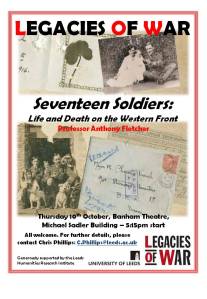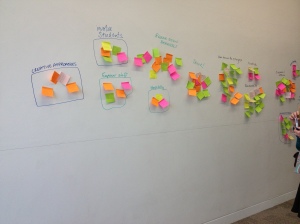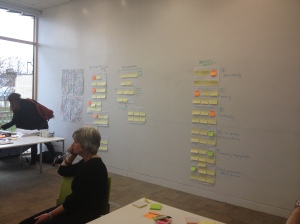So, those overtaking events which I wrote about when I posted last week… We’ll get to that in a minute. Firstly, a quick word about those deadlines that got in the way of posting my blog for most of January.
The biggest of these was a mid-January interview at the Wellcome Trust for a University Award, a hugely prestigious award which would fund five years of research and ensure me a permanent job at the end of it. The interview was friendly but very, very tough. At least one question caught me on the hop and I answered it to the best of my ability although not, as it turns out, terribly well. Because the following week I found out that I had not succeeded.
This news flattened me, almost entirely literally. I lay on the table in my office and howled about it for a good three minutes. Over a year of effort, involving two two-part applications (one a detailed revision) had gone into getting to the interview stage. This was a project I believed in passionately. The criticisms of my project were directed at what I felt were two of its fundamental elements. I was left wondering whether or not I had any sort of future as a professional historian.
The prospect was terrifying. My current grant from Wellcome enabled me to return to academia after a five-year break. Given that this was my second act already, I knew there would be no comeback if I was forced to leave academia now. But reverting to the status of temporary lecturer at this point in my career seemed equally unthinkable. I am, as my by-line states, a wife and mother as well as a historian. Two young children make me much less flexible than when I finished my PhD, in terms of time as well as geography. The sort of commuting to make ends meet discussed by Cath Feely simply isn’t an option for me any more.
The problem was that there was no time for me to assimilate any of these emotions of grief or fear. Because more deadlines loomed – a resubmission to the European Research Council and an all-day interview for a prestigious academic fellowship at Leeds – both on the same day. Both in their different ways were equally vital. Both required very different things from me in terms of communicating my research plans coherently and, above all, with passion and conviction.
So, while the previous 15 months of applications might have felt like something of a tunnel, they were nothing to those last three weeks of January. My life was haunted by these two projects – the written application and the oral presentation and interview. I ate and slept them. On the Sunday before the deadline my husband and I went for a three-hour hike; I rehearsed answers to interview questions the whole way up and revised the role of the postdoctoral research assistant on the ERC proposal the whole way down. I rehearsed and revised my presentation daily, explaining slides to imaginary audiences as I pounded the pavement on my morning run.
And in the end…
Reader, I got the job.
As of 1st May I will be University Academic Fellow in Legacies of War. It is (subject to probation) a permanent position as member of the School of History. It is, in all sorts of ways, my dream job and, in obtaining it, I have not only established that I have an academic career but finally, definitively made that transition from early to mid-career. I have come out of the tunnel and into a landscape at once deeply familiar and strangely new. I am delighted, terrified, exhilarated. And no, the reality, the permanence of it all, and what that means for both me and my family, still hasn’t quite sunk in yet. I still keep getting small shocks of amazement and happiness, at a comment from a colleague, at the sight of my library card.
So there you have it. Now I too have my own particular story of the path I took as a young academic. It has not been an easy path so far, although yes, unequivocally, it has been worth it to get here. I am profoundly grateful, to more people than I can possibly say without sounding like a very bad Oscar’s speech, that it doesn’t end here. So I repeat what I have been saying, if occasionally through tears and gritted teeth, since December:
Onwards! And this time, upwards as well!
Now, about that book I need to write…





